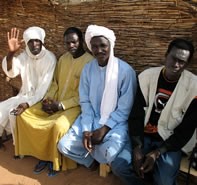Mararit, Abiyi in Sudan

Photo Source:
Frontiers
|
Send Joshua Project a map of this people group.
|
| People Name: | Mararit, Abiyi |
| Country: | Sudan |
| 10/40 Window: | Yes |
| Population: | 43,000 |
| World Population: | 103,000 |
| Primary Language: | Mararit |
| Primary Religion: | Islam |
| Christian Adherents: | 0.00 % |
| Evangelicals: | 0.00 % |
| Scripture: | Translation Started |
| Ministry Resources: | No |
| Jesus Film: | No |
| Audio Recordings: | Yes |
| People Cluster: | Ouaddai-Fur |
| Affinity Bloc: | Sub-Saharan Peoples |
| Progress Level: |
|
Introduction / History
Tama is a collective term used to describe a cluster of languages and ethnic groups that live on the borders of Chad and Sudan. The various languages spoken are all dialects of the Tama language. The Tama-speaking peoples are divided into a number of subgroups, which include the Abu Sharib, the Kibet, the Mararit, the Kimr, the Sungor, the Erenga, and the Tama. Today, the Tama are citizens of the independent nations of Chad and Sudan. Some Tama subgroups have their own subgroups, but they most likely live like the other Tama groups. For example, the Mararit have a subgroup we call the Abiyi. This group straddles Chad and Sudan like many other Tama groups.
What Are Their Lives Like?
The Abiyi Mararit rely on farming and raising cattle for their livelihood. Their main crops include millet, sorghum, sesame, peanuts, okra, onions, chilies, watermelons, and various other vegetables.
Because of the sandy, hilly topography and the shortage of rainwater and ground moisture in Sudan, the only agriculture possible for the Abiyi Mararit is dry land farming. Their livestock includes camels, cattle, goats, and sheep. These provide milk and other dairy products, along with wool and leather. These tribes also hunt guinea, fowl, and gazelles for meat. One of their main dishes is millet served with various sauces, especially goat meat, okra, and onions.
Mararit women gather products from the forests on a regular basis, particularly during the rainy season. The products include wild grasses, berries, and honey, along with useful tool-making or building materials. Abiyi Mararit women also help work in the field; engage in basketry, pottery, and other crafts; and brew beer from millet, both for consumption and to sell or trade. The men do most of the field work and trade at the local markets. They may also work as craftsmen or merchants.
Due to the poor natural resources and economic conditions of the region, some of the Tama migrate from their home territories, searching for work elsewhere, usually in the Nile Valley. Some modern occupations include jobs as clerks, teachers, tailors, drivers, automobile mechanics, and middlemen in trade.
The Abiyi Mararit live in village compounds. Their houses are round, with diameters of 15-20 feet. The walls are made of coarse reed mats, and the cone-shaped roofs are made of thatched reeds. Some homes, however, have lower, more narrow entrances to keep out the lions and hyenas that roam throughout the region. Each village settlement is ruled by its own chief. The chief gives advice to the villagers, handles disputes, and makes important decisions. Each village chief answers to a territorial chief, who, in turn, answers to a higher government official.
Modern schools are not available in most Mararit regions. Education is limited to the Islamic schools attended by boys. Therefore, only a small percentage of the Abiyi Mararit can read.
What Are Their Beliefs?
All of the Tama tribes are Muslim. They adhere to Islamic teachings and hold the traditional Muslim ceremonies and festivals. Many of the tribes also mix animism (belief that non-living objects have spirits) and witchcraft with their Islamic practices.
What Are Their Needs?
The Tama desperately need dedicated Christian laborers to live among them and share with them the love of Jesus. Since most cannot read or write, non-print resources would be the best way to reach them. People who are skilled at writing music and skits that appeal to them would probably be welcomed into Abiyi Mararit villages. Christian teachers might also have open doors into these tribes.
Prayer Points
Pray for the Lord to thrust out workers to the Abiyi Mararit people.
Pray that they will have a thirst for the water of life that only Jesus can provide.
Pray for the Lord to provide the Abiyi Mararit people with adequate rain for their crops as a testimony of his goodness and love.
Pray for a movement to Christ that cannot be stopped.